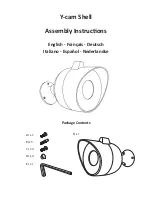
Third Trimester – The nervous system has matured and becomes fully
formed; the brain enters a rapid growth phase; movements are more
coordinated and muscles are stronger; the fetus moves to the rhythm of
music; sight has developed and response to light is evident; movement is
less frequent but stronger toward the end of the ninth month; and growth
and development continue until birth.
HOW YOUR UNBORN BABY’S BRAIN DEVELOPS
Your baby’s brain begins developing almost immediately and by the fifth
month the number of brain cells your baby will have for the rest of her life
is determined. From this point forward her brain develops by increasing
the size and complexity of the cells already created. Around the eighth
month your unborn baby’s brain changes significantly. At this time it doubles
in weight and the connections between the brain cells, known as
synapses, become even more complex.
The following is the structure of a brain cell:
1. Dendrites – receive messages from the body
2. Cell body – decides whether to send the message received from the
dendrites or to store it
3. Axon
– transmits messages received from the cell body
As the cells get larger, the axons grow longer and the dendrites become an
increasingly complex system of multiple connections like branches of a
tree. The more stimulation the cells receive, the more complex these
dendrites become, resulting in a more developed brain.
The number of brain cells your baby is born with helps determine her
potential, but it is also the number of connections between these cells that
determines her final intelligence. Helping to increase the number of
connections and the complexity of the brain cells with stimulation increases
the probability of your baby having a higher intelligence level and IQ.
RESEARCH FINDINGS
It is now known that stimulation of the senses affects the growth of the
brain cells and if a fetus has little stimulation in the womb, fewer connections
are made. Specialists in fetal and infant brain development have agreed
that stimulating your unborn baby’s senses can affect the development of
the connections between the brain cells. In fact, the lack of these connections
can actually cause cells to die, especially in the eighth month of
pregnancy.
By the end of the fifth month your baby can hear and begins to learn, and
you can tell when she is reacting to external stimulation. In one case, pregnant
mothers actually had to leave a concert of classical music before it was over
because their babies were kicking so hard in time to the music
that they couldn’t tolerate it.
3
In another case, mothers were asked to play their favorite classical music
to their unborn baby for ten minutes a day at a volume that was just a little
louder than a normal speaking voice. It was discovered that the babies
recognized the change in their environments immediately as was evidenced
by their heart rates increasing noticeably. What is also interesting is that the
unborn baby does not respond in this way to many single notes even if
they are played very loud and very close to her.
4
Yet another study showed that unborn babies who had classical music played
to them from the middle of the fifth month until they were born, for 10
minutes, twice a day, developed more quickly, began to talk up to six months
earlier, and had greater intellectual development than those babies who had
not had classical music played to them inside the womb.
5
2
15
14









































